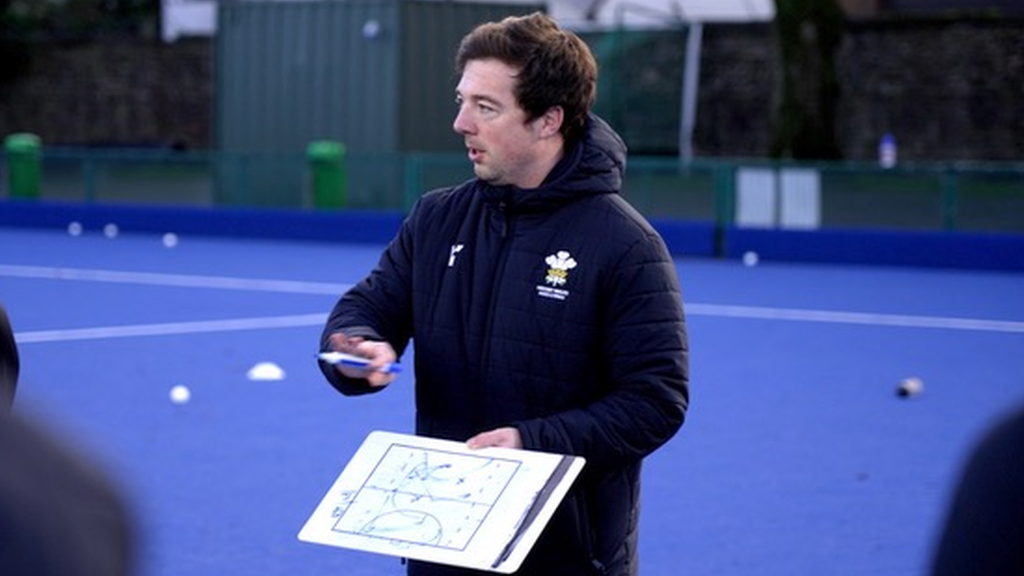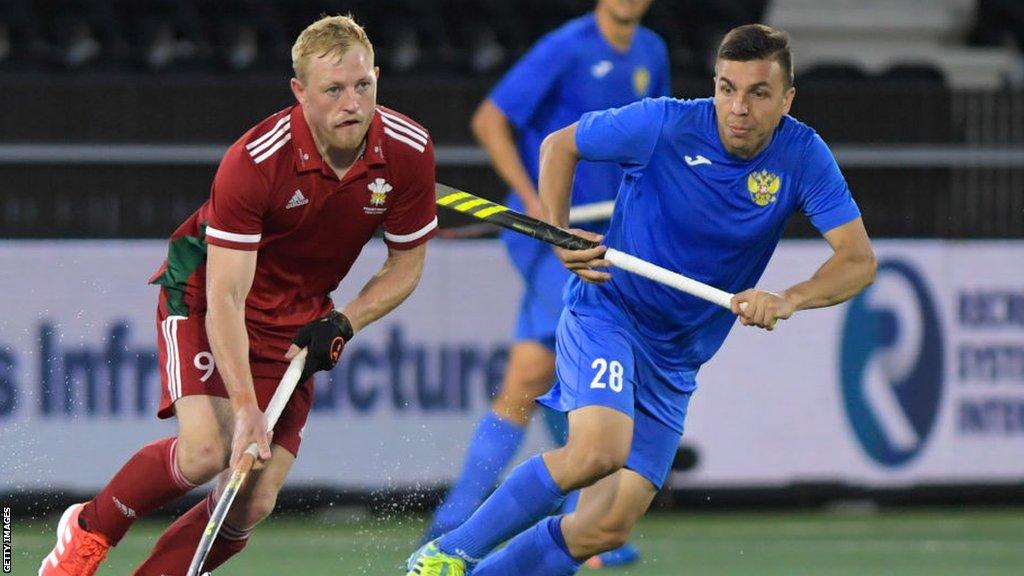Hockey World Cup: How Wales' part-time men's side gatecrashed elite
- Published
'A pinch-yourself moment' - how part-timers Wales made the Hockey World Cup
It is an underdog story even the FA Cup would struggle to match.
Wales - a part-time team of students, teachers and a financial analyst - taking on the world's top professional hockey players.
Almost 128 years after their first international match, Wales are going to their first men's Hockey World Cup.
"It's bigger than we've ever experienced - anyone in the squad, staff included," co-captain Luke Hawker told BBC Sport Wales.
"Hockey is a hobby for the vast majority of us - it's what we do in our spare time, on evenings and weekends.
"To be going to a World Cup and playing and performing on that stage, it's a pinch yourself moment really."
The men's Hockey World Cup takes place in India from 13-29 January.
Wales secured their historic qualification in dramatic fashion.
A shootout win over Ireland in Cardiff back in October 2021 completed a remarkable rise to hockey's top table.
Although Wales had won a bronze medal at the six-team 1908 London Olympics, in their first 50 international matches they won just three times.
It took them 70 years to beat neighbours England, who they now face at the World Cup on Friday.
Less than a decade ago, Wales were languishing in the third tier of European hockey.

Danny Newcombe worked as the assistant coach to Zak Jones before being appointed his successor
"It was a pretty dark time for us," admitted head coach Danny Newcombe.
"It did give us a chance to reset the group and reset what we were doing - and then go on this amazing adventure and journey with this amazing group of guys.
"There's no magic bullet here. We've got a good group of players - a good group of people. We've stuck together and just improved incrementally.
"So the strength is in the collective learning the group's done over six or seven years. The core of the group's been together for a long time now."
Promotions to the second and then top tier of the European Championships followed in quick succession. Then came the victorious performances at the World Cup qualifiers in 2021.
But throughout this time Wales, like always, had been squeezing in their training sessions on weekends and bank holidays - fitting them around the players' jobs.
Every few weeks the squad travel to Cardiff after work on a Friday. There are double sessions on Saturday and Sunday, before they are back at work come Monday morning.
Any tournament - like the World Cup or last summer's Commonwealth Games - involves most of the players having to take annual - or even unpaid - leave.
A part-time programme also means the squad do not just give up their free time to play, but also their money.

Rupert Shipperley (left) was one of two Welsh players to go to the Tokyo Olympics with Great Britain
The Wales players partly fund the programme themselves.
"It brings us closer together because we know what we've had to sacrifice," added Hawker.
"If you ask any of the group why they part with a sum of money to commit, whether or not they're selected to have major tournament experience, they love being part of the group.
"The experience is unrivalled. That's why we contribute. It adds a certain degree of strength, resilience and togetherness."
But just getting the squad to India has been a huge financial challenge for Hockey Wales.
They were even forced to started a crowdfunding campaign to make up the shortfall in funds.
Chief executive Ria Burrage-Male hopes seeing Wales on the world stage will be a catalyst for crucial changes.
"Public funding only stretches so far, so as a result the players will contribute around 50% towards the player programme," she told BBC Sport Wales.
"That's a problem - that's not sustainable.
"If you don't have money you might not be able to play the sport. That is hugely problematic and it's something we have to address.
"I fundamentally believe people shouldn't have to pay to play for their country. It's an absolute honour and we shouldn't be in a position where the sport is not sustainable because of the cost to play.
"We have to be more visible, we have to raise our profile. I hope we just inspire a generation of people to pick up a stick and keep our sport alive."
Wales face England, Spain and hosts India in Pool D. They are all ranked in the world's top eight.
Trying to go beyond the group stage will be Wales' toughest challenge yet - but it is one they are up for.
"Just being there is a huge achievement," said Rupert Shipperley.
"Tokyo was absolutely huge but a World Cup with Wales, with this group of players we've had for the last seven to eight years, is something really special.
"We want to cause upsets. We'll be throwing punches. It's putting Hockey Wales on the world scale and letting them know we're here to stay."

A CAREER CHANGE WITH A DIFFERENCE: Police new recruits adapt to life on the beat
THE CRASH DETECTIVES: Inside the cordon with Gwent Police's forensic collision investigators
